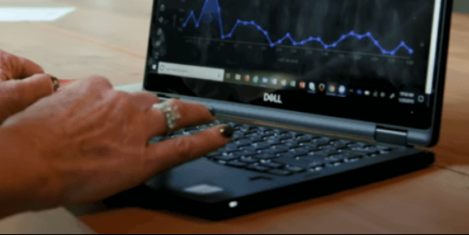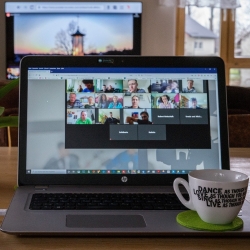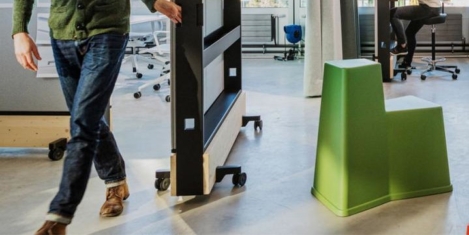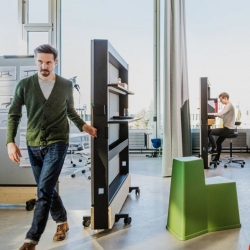To provide the best experiences, we use technologies like cookies to store and/or access device information. Consenting to these technologies will allow us to process data such as browsing behaviour or unique IDs on this site. Not consenting or withdrawing consent, may adversely affect certain features and functions.
The technical storage or access is strictly necessary for the legitimate purpose of enabling the use of a specific service explicitly requested by the subscriber or user, or for the sole purpose of carrying out the transmission of a communication over an electronic communications network.
The technical storage or access is necessary for the legitimate purpose of storing preferences that are not requested by the subscriber or user.
The technical storage or access that is used exclusively for statistical purposes.
The technical storage or access that is used exclusively for anonymous statistical purposes. Without a subpoena, voluntary compliance on the part of your Internet Service Provider, or additional records from a third party, information stored or retrieved for this purpose alone cannot usually be used to identify you.
The technical storage or access is required to create user profiles to send advertising, or to track the user on a website or across several websites for similar marketing purposes.
 Dr Leyla Acaroglu, and intranet provider, Unily, have launched the Future of Workplace Sustainability Report, which explores how sustainability, climate change and COVID-19 are shaping the future of the workplace. We are living in a time of great and immediate change, and COVID-19 and climate change are just two of the most obvious forces impacting our way of life. (more…)
Dr Leyla Acaroglu, and intranet provider, Unily, have launched the Future of Workplace Sustainability Report, which explores how sustainability, climate change and COVID-19 are shaping the future of the workplace. We are living in a time of great and immediate change, and COVID-19 and climate change are just two of the most obvious forces impacting our way of life. (more…)






 Climate change has accelerated the urgency to address the way people live and work. With the UK’s aim to become carbon neutral by 2050,
Climate change has accelerated the urgency to address the way people live and work. With the UK’s aim to become carbon neutral by 2050, 
 With a new national lockdown, the situation in the UK remains unpredictable and complicated, and renewed pressure to work from home has forced many organisations to reverse their back-to-work plans, according to a new study from
With a new national lockdown, the situation in the UK remains unpredictable and complicated, and renewed pressure to work from home has forced many organisations to reverse their back-to-work plans, according to a new study from 
 In the
In the 
 GlobalWebIndex (GWI), together with LinkedIn’s B2B Institute, has launched “
GlobalWebIndex (GWI), together with LinkedIn’s B2B Institute, has launched “
 A new study by
A new study by 
 A new survey by
A new survey by 
 New research from
New research from 
 After 20 years in their Clerkenwell showroom, global design brand Vitra is set to move into a new space in Rolling Stock Yard, Kings Cross, which will open in January 2021. The temporary Kings Cross space will host a working installation looking at new office solutions for more flexible working. Vitra will open a new permanent UK flagship showroom in the Summer of 2021 and will announce the location in the coming months. The move comes as Vitra’s lease on its current Clerkenwell space draws to an end.
After 20 years in their Clerkenwell showroom, global design brand Vitra is set to move into a new space in Rolling Stock Yard, Kings Cross, which will open in January 2021. The temporary Kings Cross space will host a working installation looking at new office solutions for more flexible working. Vitra will open a new permanent UK flagship showroom in the Summer of 2021 and will announce the location in the coming months. The move comes as Vitra’s lease on its current Clerkenwell space draws to an end. 
 The physician can bury his mistakes,—but the architect can only advise his client to plant vines. Frank Lloyd Wright’s eternal epigram is not just true for buildings. It also applies to the authors of books, especially those on the subjects most affected by this year’s pandemic. Speakers and blog writers can quietly inter the things they get wrong, while the book sits unchangeable on a shelf. Maybe behind a houseplant.
The physician can bury his mistakes,—but the architect can only advise his client to plant vines. Frank Lloyd Wright’s eternal epigram is not just true for buildings. It also applies to the authors of books, especially those on the subjects most affected by this year’s pandemic. Speakers and blog writers can quietly inter the things they get wrong, while the book sits unchangeable on a shelf. Maybe behind a houseplant.









November 19, 2020
Covid-19 is levelling the playing field for disabled workers
by Ruby Gullon • Comment, Flexible working, Wellbeing